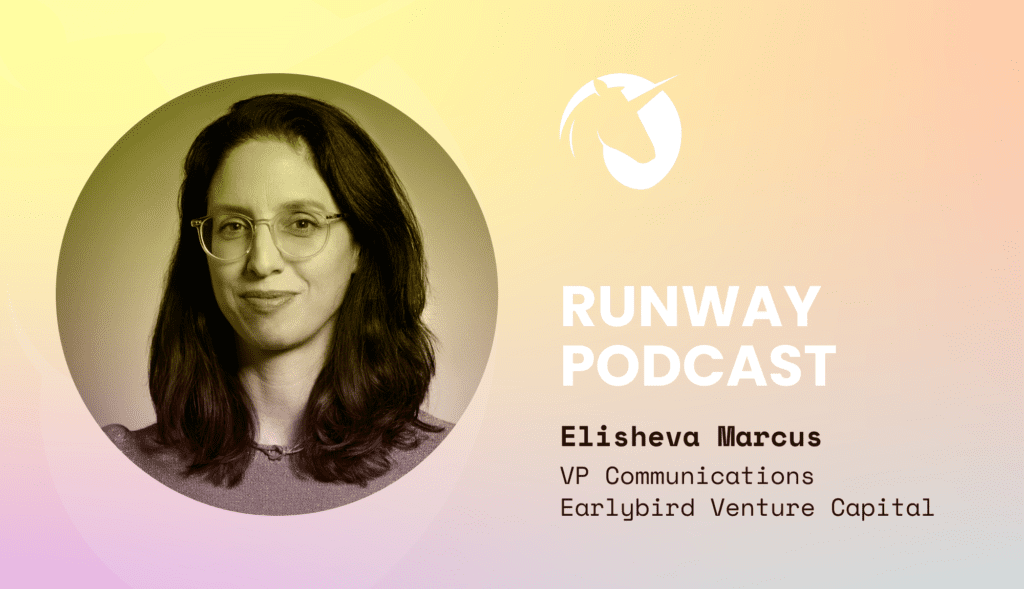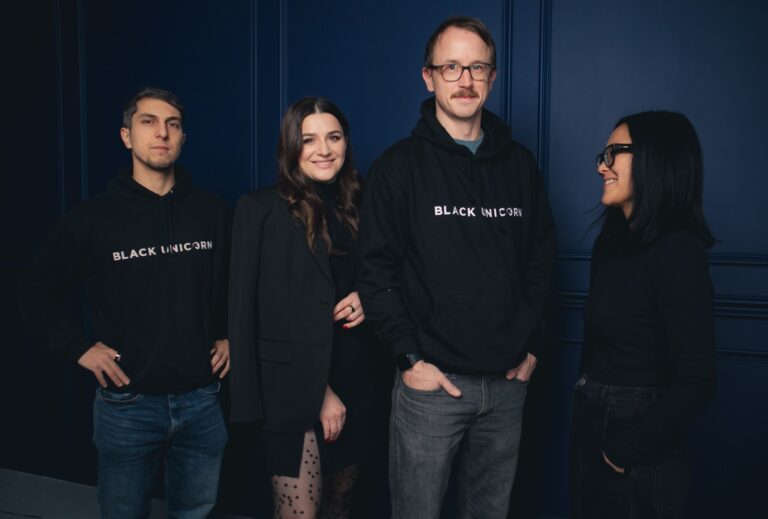In the world of venture capital, storytelling plays a crucial role in shaping both brand identity and public perception. But how does communications differ between VCs and startups? And what does it take to craft a winning narrative in an industry driven by trust, bold ideas, and growth?
In this episode of Runway, we had the pleasure of speaking with Elisheva Marcus, VP of Communications at Earlybird VC, one of Europe’s leading venture capital firms. Elisheva shared her wealth of knowledge on everything from building a strong PR strategy, managing both proactive and reactive communications, to supporting startups with their fundraising announcements and beyond.
Elisheva offers an inside look at the often-overlooked yet highly strategic role that comms plays in the venture capital ecosystem. Whether you’re a startup founder looking to build your public profile, or a VC firm aiming to enhance your brand’s footprint, this conversation is packed with valuable takeaways.
Read on for the full transcript, and don’t forget to listen to the podcast episode for more in-depth insights from Elisheva. Just hit play on the Spotify box below!
Check out the full transcript:
Julija Jegorova: Hi everyone, today we have yet another very special guest, Elisheva Marcus, who also goes by Ellie. She is the VP of Comms at Earlybird VC.
Elisheva Marcus: Ellie, it’s lovely to be here.
Julija Jegorova: Thank you. I appreciate it.
Julija Jegorova: So just to give a bit of background to our listeners, could you tell us a little bit more about yourself, and what was your journey in comms and PR before you joined Earlybird?
Elisheva Marcus: This summer, I was reading this book called *Go Like a River*, and I was thinking about how that’s like a parallel to my professional life, meaning that the river flows and it hits a lot of things along the way, and that forms the identity of that river. For me, that river has taken a very international route, meaning I’m from the US, but I’ve also lived in Israel, Argentina, Canada, and now Germany. It was only when I came to Germany that I entered the startup world. But everything I’ve done professionally has led to who I am now. Some of those things?
I’ve worked in newspapers, educational science publishing, and museums, so I’ve done a lot of storytelling throughout my career, which has led to what I’m doing now. I’ve worked in company builders, accelerators, and have always been telling the stories of founders I met along the way. That’s how I found VC as a perfect place to support multiple portfolio companies all in one zone. I also studied interesting things that I still use in my own way, like classical printmaking and Latin American Studies. I went on to do my graduate work in Biomedical Communications, where I learned how to tell complicated stories about anatomy and microbiology. What I’m always doing is breaking down complexity for different audiences, and that’s what I’m doing now.
Julija Jegorova: And how about your day-to-day, right? Because working in PR and comms in VC seems to be quite different than working in-house at a big corporate or startup. Could you maybe talk us through what your day-to-day looks like?
Elisheva Marcus: Yeah. The thing about the day-to-day in the comms world is that it’s never the same, and that’s exactly what I love about it. It’s so varied, and it’s really a mix of what’s planned and proactive, all the things we set out to do to showcase the investment team, position them well, and highlight the portfolio companies—their wins, what they’re up to—and talk about key topics around the European VC ecosystem. And then there’s the reactive side, dealing with current news stories or anything adjacent to the VC tech startup world, so you learn to be flexible. My day is really a combination of both, the proactive and the reactive. I spend much of my time on email, in meetings, ideating, and working with a great team. I’m lucky to have Riley in our communications team at Earlybird, as well as Elena at Earlybird Health. So yeah, really helpful to spar with others.
Julija Jegorova: How big is your team right now?
Elisheva Marcus: The thing is, I work so closely with so many people. Earlybird is considerable in size, and I collaborate a lot with people in our ecosystem, the portfolio, journalists, and organizations like NGOs. So it feels very connected, even though it’s a rather small in-house team.
Julija Jegorova: So you’re not just blasting out press releases for the sake of blasting out press releases, are you?
Elisheva Marcus: No, that’s not my style. I have opinions on press releases, and I edit a lot of them.
Julija Jegorova: We come from an agency background, so we work with a lot of VCs and startups. You work with VCs in-house and startups—how is PR for startups versus VCs different, since you do both?
Elisheva Marcus: The thing is, in some ways it’s the same because, at the heart of it, PR is public relations, right? You’re having public relations whether you’re a VC or a startup. The commonality is you need to be bold, concise, and truthful—this is clear, I think. And you have to make people care. Where I see differences is in decision-making. When you’re in a VC fund, you simply have more partners, more stakeholders, and it’s a broader focus. You’re selling trust, right? That’s the exchange. With a startup, it’s usually a smaller pool of decision-makers, C-level, it’s focused. There’s a CEO, for example, and it’s more niche, product or solution-focused. So that sets you up for different ways of operating, but in the end, there’s a lot of common ground.
Mauro Battellini: In general, you don’t really see that many VCs that have their own in-house comms person. How do you think that benefits a VC fund? They want to attract startups, they want to look more trustworthy, enhance their image, etc. How much are VCs losing out by not having a comms team?
Elisheva Marcus: Excellent question. In a way, you’re asking me to defend my role, which I’m happy to do! The thing is, you’re at such an advantage if you have a comms expert at your side as a strategic advisor and someone who can operationally support the VC fund. There are many examples—crafting a narrative, giving a voice to team members and their specialties. Just as I can’t imagine any successful company not having a narrative, I can’t imagine a VC without that either. Especially as you grow. You need someone to guide those stories, build relationships with journalists, and help employees and teammates be part of that storytelling. It’s such an advantage, on top of brand building and other aspects, like sourcing photographers or pitching people for events. I just think it’s a must-have that really has long-term benefits.
Mauro Battellini: I was going to say the most well-known VCs are gigantic, mostly US-based. But when I think about the ones that come to mind, it’s the ones that are active with storytelling, like you say.
Elisheva Marcus: Yeah, definitely. It’s funny because, in my connected world, I’m in touch with so many people in this role. It might be called something different, but I’m still connecting with them, both in Europe and the US. There’s so much co-learning happening. I should mention the VC Platform community, which is an amazing forum for people supporting VCs in different capacities. The knowledge sharing there is incredible. You can definitely build a bigger brand footprint if you have someone championing your VC.
Julija Jegorova: And if we take a step back in terms of your day-to-day, which is never the same, VC is a fascinating area. But if we could talk about the split—how much do you do for the VC fund and how much for the startups? And what kind of PR and comms support are startups usually looking for?
Elisheva Marcus: I would say it’s hard to give exact numbers, but I serve as a strategic advisor to anyone with questions, though I take a more proactive role on the Earlybird side since that’s where I’m on the team. That’s where I’m most effective—setting the strategy, building networks with media, being the touchpoint, and bringing story opportunities to the right people. There’s plenty to do there, from brand development to social media and content creation. As for the portfolio, I’m carefully supportive. I’m not on their team, but I’m here to support them as needed. They usually come to me at an early stage, often when they have a funding round announcement, and that’s where I can really add value—sparring with them, giving guidance on fundraising news, and helping them understand the landscape of journalists covering them. Over the years, I’ve built a history at Earlybird, so I can draw on that to answer their questions and help them with storytelling. As they grow, they often hire their own comms people, and then I can work with that person to strategize and support them.
Mauro Battellini: For people that don’t know, some might think that VCs use their comms functions as a centralized support or cost center for their startup portfolios, but that’s not the case at Earlybird. That’s also not typically the case when a VC has a comms person, right? It’s focused on the fund, and similar to investors, the comms team supports startups but doesn’t execute for them.
Elisheva Marcus: Yes, it’s more strategic than operational for a variety of reasons, especially when it comes to the portfolio. That’s correct to say, though I can’t speak for all funds. Different funds might have different setups, but I believe this is generally the case.
Julija Jegorova: Having worked with so many startups at various stages, what are the most pressing questions they ask you? A lot of founders and entrepreneurs have never been exposed to PR and communications. They might think it’s just about sending out a press release, but what are the most common questions you get from startups new to PR?
Elisheva Marcus: Great point. I have to start with, “It depends,” because some founders are serial entrepreneurs and have done this before, but that’s not the majority. More typically, a founder might be new to PR, comms, or marketing. The fundamentals are always a good place to start: What is an embargo? What is an exclusive? These are crucial. Sometimes they don’t quite know what they want to ask, so I guide them through that. I’m always keen to know, what problem are they solving, and how are they doing it uniquely? Then I help them sort through journalists covering their industry. We also talk about timing—when to get involved with the news cycle. There’s a mix of timing and lingo. In comms, we use terms that aren’t always familiar, so it’s about teaching that quickly. PR isn’t rocket science—it can be taught. Then everyone is on the same page. Other common questions touch on the difference between comms and marketing, brand development—it’s a vast area.
Julija Jegorova: At what stage do you recommend startups look for comms support, either by hiring someone or getting agency support?
Elisheva Marcus: I don’t think there’s a wrong answer here. From pre-seed, it’s probably a good idea to either rely on a comms freelancer or find a design or digital agency to spar with. A PR agency might come later, maybe from Series A onward, but it depends on their needs—how much publicity they want, what their budget is, etc. I would just remind startups that journalists are keen to talk to CEOs and founders, so it can actually be an advantage to have a small team. You don’t need a big comms function at a very early stage. However, it’s important to learn about PR early, understand where you’re going with it, and how to craft your narrative to push through your own channels. This can be done through a freelancer, agency, or eventually hiring in-house, which can be a game-changer.
Julija Jegorova: From my perspective, a lot of times it’s about time. People don’t always understand the time and effort it takes to craft a good pitch, write a good press release, and wait for that exclusive. Some think you just write a press release, send it out, and whoever knows your name picks it up. They don’t realize how much work goes on in the background. PR professionals really are heroes without capes!
Elisheva Marcus: Absolutely. Timing is so crucial, and planning four weeks in advance of a funding announcement is ideal. The first two weeks are often about stakeholder management—getting everyone on board with the wording and alignment. That takes time. It’s also helpful for startups to see examples of what a good funding announcement looks like. PR isn’t just about blasting out news; it’s about conveying the right information professionally. Even if people say the press release is dead, it’s not. Someone still has to give information from one person to another. Journalists need a professional photo and a great story that relates to the broader industry they’re covering. It’s important to start early and get input from all stakeholders, package that up, and present it in a way journalists can understand. It’s all about fitting into a bigger picture than just your startup, and that’s where comms people can help.
Julija Jegorova: And just to go on record about funding announcements, they’re not just about the numbers, right? It’s about the story behind it.
Elisheva Marcus: Exactly. You need to make people care. There’s so much information out there, so how are you going to convince someone to care about what you’re saying? You need to think beyond your own bubble and consider how your news fits into something broader. That’s a win for you, the journalist, and the reader—a triple win.
Julija Jegorova: What would be your top tips for the perfect funding announcement?
Elisheva Marcus: Start early—this is key. Align all your stakeholders, get a juicy, interesting quote from both an investor and the startup’s leader. Think about influencers in your space, journalists, and how to activate your employees to share the news. Repurpose and recycle your news, too—you’ve put a lot of effort into this content, so make sure you share it on your own channels. And remember, it’s not just about the funding announcement in isolation; it’s part of your broader strategy.
Julija Jegorova: Public relations and communications in startups isn’t just about funding announcements. There are many other instances where PR can be implemented. What are some other ways startups can engage in PR activities?
Elisheva Marcus: Yeah, absolutely. What I’ve seen work well is educating and informing people in an accessible way. If a startup is building a comprehensive content plan, it should be a mix of owned, earned, and paid media. Showcase your team, your values, and add a human element—it doesn’t always need to be technical. Faces perform well, and it’s inclusive and authentic. Start simple, define yourself in a Google Doc, and you can come back and revise it as you grow. This core can guide your brand, and from there, you can expand into different formats like videos, interviews, or podcasts.
Mauro Battellini: We’ve mostly been talking about producing comms, but I wanted to understand how you consume news. How do you follow a potential candidate for investment or news from other startups, and how does that affect decision-making at Earlybird?
Elisheva Marcus: I definitely pay attention to founders on channels like X (formerly Twitter). I try to understand their pain points, what they’re struggling with, and what they’re proud of. I read a lot of news articles from my ecosystem and keep up with the portfolio companies. But just to be clear, as a comms person, I’m not making investment decisions. Our investors probably have their own signals and focus areas. From a comms perspective, I approach it from a different angle, looking for storytelling opportunities and understanding the broader ecosystem.
Mauro Battellini: I was wondering if from the investment side, they look for certain technical expertise or coverage of a startup that helps influence their decisions.
Elisheva Marcus: Absolutely. Media coverage, third-party recognition—it all helps. It signals growth, traction, and expertise, which can be interesting to investors. And I do encourage founders to boost their personal brands by speaking about their expertise, which helps build trust. That’s useful for pre-investment or later rounds, and it’s helpful for investors to see someone who’s knowledgeable and vocal about their industry.
Julija Jegorova: I have a couple more questions. What are the top three common mistakes startups make when doing PR? No need to name names, but maybe share some stories where you thought, “This was a mistake.”
Elisheva Marcus: Common pitfalls would be not having a professional photo ready—it’s basic but crucial. Another mistake is not having materials final enough to pitch and then asking journalists for changes after the fact. It doesn’t reflect well, and it’s unnecessary. Lastly, make sure your website and other channels are working properly and up to date before any launch. Housekeeping, like having your social media profiles current, is important. These are all small steps that make a big difference.
Julija Jegorova: And to wrap up, let’s talk about funds and PR. What basic PR hygiene tips would you give to funds of any size?
Elisheva Marcus: Start with a strong brand identity and make sure it’s reflected consistently across your channels. Your website is key—it should be clear, accessible, and do a lot of the heavy lifting. Make sure it’s easy for people to contact you. Also, activate your team—help them showcase who they are as investors, and let them build their networks and brands. LinkedIn is a great channel for organic growth, and we’ve seen that at Earlybird. Being thoughtful about what you post, ensuring it’s relevant and interesting, will grow your audience and strengthen your brand.
Julija Jegorova: Thank you so much for your insights, Elisheva! And where can people follow you?
Elisheva Marcus: You can find me on LinkedIn, where I’m very active, sharing and tagging people. I’m also still on X (formerly Twitter) under the same name. For Earlybird, you can find us on LinkedIn, X, and Instagram. We also have a Medium page—Earlybird View, where we post lots of great articles. Thank you so much for your curiosity and for chatting with me today!
Julija Jegorova: Thank you, Elisheva! It’s been an honor.
Elisheva Marcus: The pleasure is mine.
Can’t get enough of the Runway pod? Check out these other episodes:
Matthew Thompson, Director Sales Development EMEA at Deel: Running and Scaling Inbound Sales
Eric Melchor, founder of B2B PodPros on running and advertising on podcasts
The Ins and Outs of LinkedIn for Startups with Kotryna Kurt
Affiliate Marketing 101 with Vik Ratomske of Partnergap
Adam Jennings on the foundations of branding
Silicon Valley veteran Gregory Kennedy on B2B startup marketing
Robin Wauters on European tech, the business of media and AI
Ex-Fortune editor Jake Meth on planning, writing and pitching the perfect op-ed



